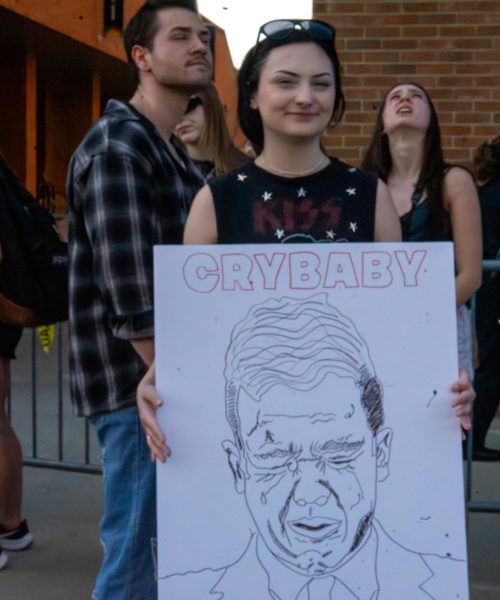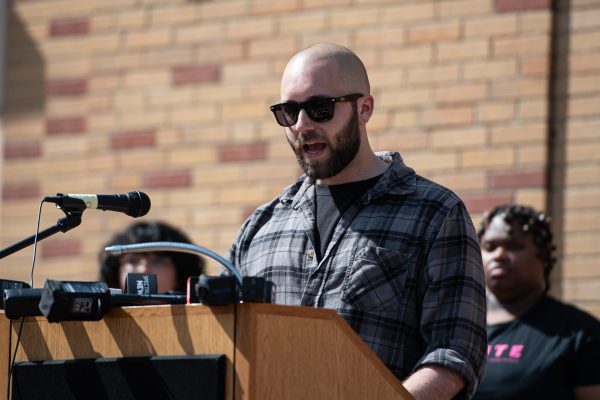High-quality applicants flood Honors College, creating hold on admissions
February 11, 2010
No students have been turned away
An increase in academically strong students applying to Kent State for next fall has forced the Honors College to put a hold on admissions.
The Honors College typically invites all applicants who meet criteria — high ACT/SAT scores or high school GPAs — to join Kent State’s program for high-achieving students that has been in existence since 1933.
“We have been growing for the last three years at a pretty high rate,” said Donald Williams, dean of the Honors College. “In large part, it’s due to an improvement of the quality of students who are applying to Kent State in general.”
The Honors College grew to 1,381 total students in Fall 2009 — an increase of 149 students from the previous year.
Despite the hold on admissions, Williams said the Honors College is not turning away prospective students yet. It’s waiting to see how many of the students already invited join the Honors College, which will be more evident closer to the general college acceptance deadline, May 1.
Existing students wanting to join the Honors College and incoming freshmen who are part of the integrated life science program that feeds into NEOUCOM are among a few of the exceptions to the admissions freeze.
If spots free up, Williams said the Honors College will send more invites to prospective students.
The Honors College doesn’t set an enrollment ceiling, Williams said. Instead, the enrollment target fluctuates each year depending on availability of faculty, number of honors courses, sizes of those courses, residence hall space, advising resources and scholarships.
“My expectation is we’ll grow by some in 2010 but not by as much percentage growth,” he said.
The National Collegiate Honors Council, an association of undergraduate honors programs and colleges, doesn’t currently track enrollment figures at the universities — making it difficult to gauge whether Kent State’s Honors College growth is a dividend of university efforts or part of a national trend.
But Rick Scott, member of the board of directors for the NCHC, said certain programs’ features — such as the living-learning community in the Stopher-Johnson residence hall complex — help entice students to join.
“Schools that use scholarships or special experiences in residence halls find that they’re bringing students to the school who would not come otherwise,” he said.
Such was the case with junior theater major Brittany Barnes, who doesn’t discount the impact the amenities of the Stopher-Johnson complex had on her decision to join the Honors College.
“I initially did it because I felt like there was so much opportunity,” she said. “The dorms were a big incentive, I’m not going to lie.”
Even so, the economic collapse also may have kept high-achieving students in state lines at more affordable institutions.
“With the state of the economy, some students who may have gone to private institutions in the past are now considering public schools like ours,” Williams said. “And we may be seeing the benefit of that in the Honors College.”
To accommodate the influx of students, Williams said the Honors College has been working with other departments and schools across campus to offer more course sections and create new courses.
The Honors College also is working with the Honors College Policy Council to create its strategic plan, which will outline goals and objectives and address how to respond to this growth. Williams said he hopes the plan is finished by the end of this semester.
Christina McVay, lecturer in the English and Pan-African studies departments, has been teaching honors courses on and off since the 1980s and enjoys the creative opportunities honors classes grant both students and faculty.
“Honors students are good students, but I’m not sure they’re really, really a lot smarter than everyone else,” she said. “I think it’s because they’re better disciplined. They always come to class.”
And those classes tend to be smaller — an advantage she hopes doesn’t disappear with higher enrollment and tighter budgets.
“(Higher enrollment) is not all a good thing because our sections are bigger than they used to be,” said McVay, who teaches two honors courses this semester. “Is the university really going to put the money where their mouth is and support the Honors College financially?”
Kimberly Winebrenner, associate professor of English who teaches honors courses, admits small class sizes, creative courses and résumé-building activities attract many students to the Honors College, but she also attributes the college’s popularity to a more abstract reason: a love for learning.
“For many good students in the college, it’s just that they like to learn, and they take a good deal of pride in doing that,” she said. “It doesn’t always have to translate into ‘How does this get me a job?’”
And for some students — like sophomore James Arnold — it’s a little bit of both.
“I just wanted something a little more challenging,” said the flight technology and aeronautics major. “And it looks good on your résumé.”
Contact enterprise reporter Jackie Valley at [email protected].























